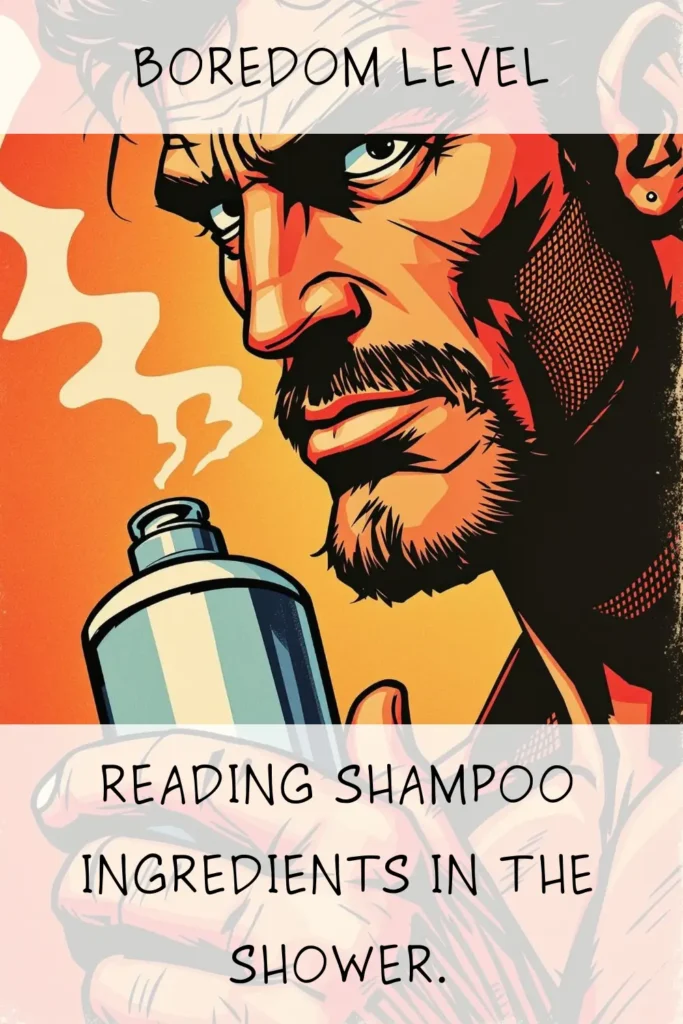Boredom vs. Distraction in the Modern Mind
If you’re searching for websites to cure boredom, look no further. Here’s the place where you can find the answers that a person asks themselves almost every day.
I read a text on a topic, ‘How many seconds is our attention span?’ In 2025, the average adult internet user’s attention span is just 8.25 seconds, down from around 12 seconds in the early 2000s. This drop is linked to constant digital distractions, making it harder to stay focused in a noisy world.
That being said, boredom is treated like a malfunction. Something to be avoided, silenced, or labeled. We live in a culture that rewards noise, motion, and dopamine loops and punishes stillness with anxiety. But this obsession with staying “busy” isn’t making us sharper. It’s making us shallow.
The ancient Stoics would see our boredom not as a glitch, but as a message.
According to Stoicism philosophy, boredom isn’t a curse; it’s a mirror. It shows you the state of your own mind when stripped of stimulation. And that kind of clarity? That’s something modern Stoicism trains for, not runs from.
This isn’t just about productivity or mindfulness. It’s about how psychology and philosophy intersect with your daily life, and whether you dare to sit with your thoughts without needing to mute them.
Because maybe the issue isn’t that we’re bored.
Maybe the issue is that we’ve lost the discipline to face ourselves in silence.
The Modern Fear of Stillness
We live in a time where being still is suspicious. Where sitting in silence is often mistaken for laziness. And where feeling bored for even five minutes triggers panic. But the Stoics would call this modern restlessness exactly what it is: a symptom of a mind untrained, overstimulated, and afraid to be alone with itself.

What is boredom a symptom of?
Boredom isn’t a failure of circumstance—it’s a failure of attention.
It shows up not because life is dull, but because we’ve dulled our ability to be present. In the Stoic mind, boredom reflects intellectual laziness—the refusal to engage with one’s own thoughts. We crave entertainment because we’ve forgotten how to reflect.
Stoicism teaches that a strong mind doesn’t depend on novelty. Marcus Aurelius didn’t scroll through constant distraction. He journaled in solitude. Epictetus didn’t seek stimulation; he sought clarity. To the Stoics, boredom was not a flaw to escape, but a space to observe the self.
So if you find yourself saying “I’m bored,” ask this instead: What am I avoiding in my own mind?
Is it normal to be bored every day?
Yes. Especially in a world that pushes constant dopamine hits, it’s completely human to get bored.
But what’s not normal is needing a screen, a song, a snack, anything, to escape that stillness. The more we train our brains to expect stimulation, the more fragile it becomes in its absence.
Modern philosophy might try to redefine this as a “lifestyle issue” or a productivity glitch. But the Stoic daily mindset is different. It accepts boredom. It even expects it. Because a quiet day isn’t a wasted one, it’s a rare chance to develop resilience.
The real danger isn’t that we’re bored every day. It’s that we think being bored is something to fear.
Do I have ADHD or am I just bored?
Not every restless moment is a sign of a medical condition.
We’re too quick to self-diagnose. Too fast to turn discomfort into disorder. But sometimes, you’re not dealing with ADHD. You’re just bored. Or lazy. Or mentally out of shape.
This isn’t to dismiss real neurodivergence. But stoicism teaches us to separate what we control from what we don’t. And one thing you can control? Your mindset. Your habits. Your response to stillness.
Not every inner tension needs to be numbed or named. Some of it just needs to be felt, examined, and endured. That’s the Stoic definition of strength.
So before you label it, sit with it. Learn from it. Let the silence sharpen you.
What the Stoics Knew About Boredom
The ancient Stoics didn’t fear being bored—they relied on it. To them, silence wasn’t empty. It was structure. Boredom wasn’t a curse. It was a mirror. In a world constantly chasing stimulation, their calm refusal to be entertained is not just refreshing, it’s revolutionary.
Is boredom a good thing?
If you’re never willing to be bored, you’ll never learn how to think for yourself. Being a boredom fighter is not a Stoic thing at all.
Stoicism philosophy teaches that boredom is not a failure; it’s an opportunity. It’s the mind’s way of telling you, “Now’s the time to go inward.”
Marcus Aurelius wrote The Meditations alone, in the cold, without a phone, without dopamine. He built his inner citadel not through endless input, but through deliberate silence. That same silence you try to escape every time you reach for something to scroll.
Marcus Aurelius didn’t distract himself from discomfort. He let boredom strip away the noise so that only the truth remained. And that’s what made him unshakable.
So, is boredom a good thing? If you’re brave enough to face it, yes. It’s not the end of stimulation. It’s the start of self-awareness.

What did Einstein say about boredom?
Einstein once said, “Creativity is the residue of time wasted.” That’s not just clever, it’s Stoicism 101.
When you’re bored out of your brain, your default isn’t dysfunction. It’s potential. Stillness activates parts of the mind that distraction keeps dormant.
The Stoic mind knew this long before science caught up. To the Stoics, boredom was never a threat; it was space. The kind of space where real thought, true clarity, and deep creativity grow.
And just like the growth mindset in education, boredom trains your patience, your focus, and your endurance. It tells your brain: “You don’t need constant input to be valuable. You need discipline to be powerful.”
When you can sit in stillness and think deeply, without flinching, that’s when you stop being reactive. That’s when you become dangerous in the best way. That’s when you become a Stoic.
Why Distraction is the Enemy of Depth
The Stoics didn’t fear chaos—they feared fragmentation. And that’s exactly what distraction does: it scatters the mind, weakens attention, and kills the ability to go deep. We call it multitasking. They called it mental slavery. In a world obsessed with beautiful distractions, practical Stoicism teaches us that depth is a discipline, and distraction is its enemy.
How distractions affect productivity
Let’s get one thing straight: the brain doesn’t multitask. It switches. And every time it does, it leaks energy, clarity, and momentum.
Epictetus advises us to concentrate on what’s within our control, and our focus is one of the few things that is.
When you let your day dissolve into ten tabs, five conversations, and three background notifications, don’t be surprised when you feel exhausted but accomplished nothing. That’s the cost of distraction: all effort, no traction.
Stoic minds weren’t built for short-term stimulation. They were trained for long-form thinking, for inner quiet, for uninterrupted thought. True productivity isn’t about speed, it’s about depth. And you don’t get depth by being pulled in twenty directions. You get it by locking in on one thing, with full presence.
So while the world praises the art of juggling, the Stoics mastered the art of immersion. That’s real focus. That’s real power.
Why can distraction be a problem?
Distraction doesn’t just slow you down—it breaks you apart.
It starts small. A glance here, a scroll there. But over time, it becomes a habit. And that habit drives you to distraction—literally and mentally. The result? You’re always busy, but rarely present. Always stimulated, but never satisfied.
This isn’t just a productivity issue. It’s a virtue issue. According to practical Stoicism, distraction feeds intellectual laziness, a refusal to go deep, think hard, or sit with the uncomfortable. It stops you from building discipline, from asking better questions, from seeing life clearly.
The Stoics believed in building strength through simplicity. Noise was not welcome in a disciplined mind. Because when you fill your day with clutter, you leave no room for clarity. And that’s where you lose the war—not in action, but in attention.
So yes, distraction feels harmless. But the Stoic would say it’s one of the most dangerous comforts of all. Because it steals your life, not with a bang, but one shallow thought at a time.
Discipline vs. Dopamine: The War Within
The modern mind is wired for quick hits—dopamine loops, instant gratification, and escape. But the Stoic definition of strength has nothing to do with pleasure, and everything to do with restraint. This is the battle: discipline vs. dopamine. The warrior vs. the comfort-seeker. And every time you choose a distraction over discomfort, you lose ground in the war for your mind.
What type of person gets bored easily?
The type of person who gets bored quickly is usually the one who hasn’t trained their attention. They’re not defective—they’re unconditioned.
A bored mind isn’t weak. It’s unused. And that’s exactly where Stoicism flips the script: boredom isn’t something to fix. It’s something to face.
According to Stoic philosopher Seneca, the untrained mind constantly seeks outer novelty because it lacks inner depth. A person with a shallow inner life needs noise to avoid their own silence. But a person who’s built discipline, who’s committed to mindset development, can sit quietly and still feel rich.
If boredom makes you itch, it’s not because you’re broken. It’s because you’ve built a habit of mental laziness. And Stoicism’s cure isn’t more stimulation, it’s stillness, repetition, and attention control. In a world of overfed brains and undertrained focus, that’s the real rebellion.

Is boredom harmful or dangerous?
Only if you fear it.
Dying of boredom… I guess everyone has said it too many times in their life. So, is boredom dangerous? Not by itself. But how you react to it can be. When you’re bored out of your gourd, you’ll do anything to escape that discomfort: scroll, snack, shop, or spiral. That’s where the danger lies: not in boredom, but in addiction to distraction.
The philosophy of Stoicism teaches us that pain is not the problem. Panic is. Seneca’s quotes echo this again and again—our suffering comes not from external conditions, but from our response to them. And boredom is no different. It’s a test of strength, not a signal of failure.
If you can learn to sit with it, to let the silence stretch, to meet your thoughts without flinching, you’ll unlock clarity most people will never touch. Stoicism sees boredom not as a threat, but as data. It shows you what you’ve been avoiding. It reveals where your mind runs when you aren’t steering it.
So don’t escape it. Examine it. That’s how a Stoic grows.
The Stoic Cure: Choosing Boredom Over Distraction
The cure for boredom is curiosity… unless you’re on page 76 of a terms & conditions document, then you’re just doomed.
The Stoics didn’t rely on external hacks or time-management apps. They relied on self-mastery. They knew distraction wasn’t just a modern inconvenience—it was a timeless enemy of clarity. Their solution wasn’t to escape boredom, but to train for it. Because every moment of stillness is a test: will you numb it, or will you use it?
How can I avoid distractions?
The first step isn’t to manage distractions, it’s to remove distractions.
Seneca believed that luxury softens the mind, and the same goes for mental clutter. Strip away the noise. Simplify your environment. Simplify your expectations.
Epictetus on control: You don’t need to control the world. You only need to control your response to it. That includes the urge to check, swipe, or scroll every time your mind goes quiet.
Seneca Stoic quotes are filled with reminders that peace begins where excess ends. True Stoic philosophy teaches that self control isn’t about restriction, it’s about freedom. And freedom begins when your attention is yours again.
How can I overcome distractions?
Distractions weaken the will. The Stoic response? Build a strong mind through repetition and deliberate challenge.
This is practical Stoicism at its core: you overcome distractions by training for focus, not waiting for motivation. Read slower. Walk without a phone. Start small, but start.
Marcus Aurelius didn’t blame his environment. He looked inward. His quotes aren’t complaints, they’re commands. He knew that mindset grows through pressure, not ease.
To overcome distraction, act like your mind is a muscle, because it is. You don’t negotiate with weakness. You train through it.
How can I remove distractions?
Distraction is often a symptom of a cluttered inner world. The Stoics practiced minimalism not just in possessions, but in thought.
Removing distractions means confronting your addiction to noise and asking, Why do I need it?
Stoicism beliefs teach that the fewer things you depend on, the freer you become. Epictetus control starts with what’s allowed into your mental space. Every unnecessary input is a thief of clarity.
So the question isn’t just how to remove distractions. It’s whether you’re willing to give up the false comfort they provide. Because silence doesn’t kill you, it reveals you. And that’s the whole point.
How to stop distractions?
You don’t stop distractions by force. You stop them by developing growth through awareness.T he
Stoicism mindset encourages daily practice, like journaling, where you pour out the chaos before it controls you. Writing isn’t just reflection. It’s training.
Use stoicism quotes as daily mental anchors. Choose one, repeat it, live it. Then sit in silence, even for five minutes, and watch how quickly the mind tries to escape. That’s where the work begins.
Stopping distraction isn’t about rigidity. It’s about readiness. When the mind is quiet, what shows up? If it’s panic, you’re not weak. You’re just finally listening.
What are good distractions (if any)?
Not all distractions are the enemy. Some beautiful distractions are aligned with your values, like nature, meaningful conversation, or deliberate rest. But don’t confuse restoration with escape.
A good distraction doesn’t leave you foggy or regretful. It restores your energy. It reminds you of what matters. But when you chase any stimulus just because you don’t want to be bored, that’s where philosophy warns you: this path leads nowhere.
According to philosophy in life, it’s not whether you distract yourself, it’s how consciously you do it. A Stoic can enjoy a walk, a book, or a fire, not to run from thought, but to deepen it.
So next time you’re drawn to a distraction, ask: Is this nourishing me, or numbing me? That’s the Stoic filter.
How to Distract Yourself from Overthinking (Without Losing Your Mind)?
Not all distractions are bad—some are strategic. If you’re spiraling, the key is choosing distractions that ground you, not numb you. Movement, journaling, cold air on your face, these aren’t escapes, they’re resets. So if you’re wondering how to distract yourself from overthinking, don’t reach for the loudest thing. Reach for the most conscious thing. That’s how a Stoic does damage control—with awareness, not avoidance.
Why Boredom Is a Stoic Superpower for Growth
We live in a time where people would rather be shocked with electricity than sit quietly with their thoughts. But the Stoics? They trained for that silence. They knew that boredom isn’t weakness, it’s a doorway. A test. And if you’re brave enough to enter it, you’ll discover what most people run from their entire lives: their actual mind.
To never get bored of your own company is a Stoic achievement.
Because it means you’ve built an inner life strong enough to carry you. A growth mindset doesn’t just chase improvement in the outer world. It sharpens the inner world. It says: “I’ll grow in stillness. I’ll train in silence. I’ll use boredom as a weapon, not a wound.”
This is why Marcus Aurelius, arguably the most powerful man of his time, spent his nights writing to himself. Not posting. Not performing. But reflecting. Alone. Quiet. Real.
And today, his words live on as Marcus Aurelius famous quotes, because he faced the void, and wrote from within it.
The Stoic virtues: discipline, courage, wisdom, temperance — aren’t built in motion. They’re forged in quiet. In those long, undistracted stretches where you could scroll… but don’t. Where you could numb out… but instead, wake up.
As the father of Stoicism, Zeno of Citium lost everything before he gained clarity. That wasn’t an accident. That was the path.
Silence is not a void. It’s a forge. And boredom isn’t your enemy. It’s your sparring partner. One that sharpens you with every quiet second you refuse to escape.
If you can master your attention, you can master your life.
If you can embrace boredom, you can embrace anything.
And if you can sit in silence without needing anything to change:
You’re already stronger than 99% of people. That’s Stoicism.




